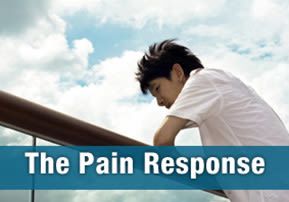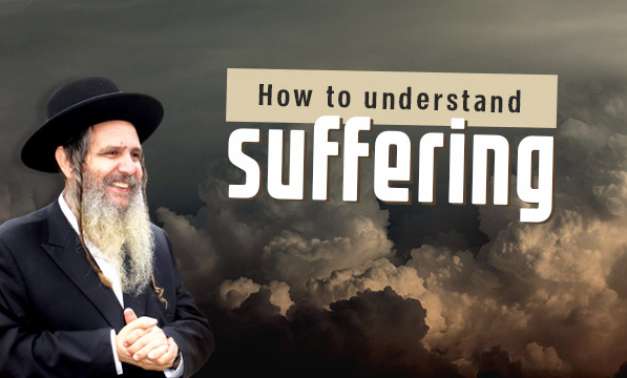
The Pain Response
When suffering, if a person would just look at Hashem’s purpose – he wouldn’t experience any suffering at all. By realizing the purpose of this suffering, one is filled with joy…

Translated, edited and adapted by Rabbi Avraham Greenbaum
Rebbe Nachman on Patience, part 2
The Cry of the Heart
When words and cries don’t help, cry deep in your heart without letting out a sound. (Likutey Moharan II, 5)
Self-nullification (bitul)
When things are very bad, make yourself into nothing. How do you make yourself into nothing? You close your mouth and your eyes, and you are like nothing!
Sometimes you may feel overwhelmed by the evil urge. You are racked with confusion and negative thoughts, finding it impossible to overcome them.
You must then make yourself like nothing. Anyone can do this. Close your mouth and your eyes and don’t think about anything – as if you have no mind and no thoughts. You are completely nullified before God. (Sichot Haran #279)
Suffering and Consolation
The ultimate goal of the entire creation is Unity: “On that day God will be One and His name One” (Zechariah 14:9) . The prophet speaks of “that day” – a future time, when the goal of the creation will have been attained: God will be One.
This ultimate goal is entirely good. For oneness – unity – is entirely good, as we learn from the comment of the Rabbis on this verse in Zechariah: “On that day Hashem will be One and His name One.” – “Is this meant to imply,” asked the Rabbis, “that right now He is not One? Of course not! What it means is that in our present state, we make a distinction between the different kinds of experiences God sends us in life. When bad things happen, we bless God as ‘the true Judge’, while when good things happen, we bless Him as ‘the good and beneficent’. But in time to come we will bless Him for everything as ‘the good and beneficent'” ( Pesachim 50a) . Thus we see that unity is the ultimate goal and this goal is entirely good.
Since the ultimate goal is entirely good, in the end everything will turn out to have been for the good. Even when bad things happen and you are beset with troubles and suffering, God forbid, by looking at the ultimate purpose, you will see that these things are not bad at all; they are actually of very great benefit. All suffering is sent from God intentionally for your own ultimate good, whether to remind you to return to God or to cleanse and scour you of your sins. If so, the suffering is really very beneficial, because God’s intention is certainly only for good.
Whatever evil and suffering you endure, God forbid, if you just look at the ultimate goal – God’s purpose – you will not experience it as suffering at all. On the contrary, by realizing the purpose of this suffering, you will be filled with joy at so much good. For the ultimate purpose is entirely good, all unity! And the deep truth is that there is no evil at all in the world: everything is good.
Then why do we feel pain when we suffer? The pain that people endure when they suffer is only because their spiritual understanding is withheld from them and they cannot focus on the ultimate purpose, which is entirely good. It is then that they feel the pain and sorrow of their suffering. But when understanding is present and one keeps one’s attention on the ultimate goal, one feels no pain and suffering at all.
The Pain Response
 This will help you understand a deep mystery: why it is a natural reflex response when a person suffers great pain, heaven forbid, as for example when having a limb amputated, that he screws up his eyes and shuts them tight.
This will help you understand a deep mystery: why it is a natural reflex response when a person suffers great pain, heaven forbid, as for example when having a limb amputated, that he screws up his eyes and shuts them tight.
When we want to look at a distant object, we narrow our eyes and screw them up in order to focus our vision on the object. Vision is the agent sent forth by the mind to bring the object into the brain. When an object passes by at high speed, we may not know what it is even if we actually see it with our own eyes, because there is not enough time for the brain to register it. Likewise when something is very far away, our power of vision may not reach there to bring it back into the brain. We are distracted by what we see at the edges of our field of vision, and in addition our vision becomes diffused over such a great distance and lacks sufficient power to bring the object into our brain.
This is why we have to narrow our eyes to see a distant object. We have to limit our vision so that other things don’t interfere, and we must focus on the desired object in order to strengthen our vision and avoid its being diffused. Then it is possible to see the far-off object.
So it is when we want to look at the ultimate goal of creation, which is all good, all unity. We must close our (physical) eyes and focus our vision – the inner vision of the soul – on the goal. For the light of this ultimate goal is very far away. The only way to see it is by closing one’s eyes. One has to close them completely and keep them firmly shut. One may even have to press on them with one’s finger to keep them tightly closed. Then one can gaze on this ultimate goal.
In other words, you must turn your eyes away from this world and close them to it completely. You must keep them tightly shut and not even glance at the vanity of this world and its mundane temptations. Then you will be able to see and apprehend the light of the ultimate goal, which is all good. And then the suffering will disappear. For the main reason why one suffers is because one is far from this goal.
This is why it is a natural response to screw up one’s eyes when suffering pain – in order to escape the suffering and nullify the pain through gazing at the ultimate goal, which is entirely good. The only way to focus on this goal is by closing one’s eyes. And even though the individual may be totally unaware of what he is doing, the soul knows everything. That is why it is a natural reflex to close our eyes when suffering pain.
To be continued
***
Rabbi Avraham Greenbaum is the director of Azamra. “The Essential Rebbe Nachman” is available for purchase online here.













Tell us what you think!
Thank you for your comment!
It will be published after approval by the Editor.